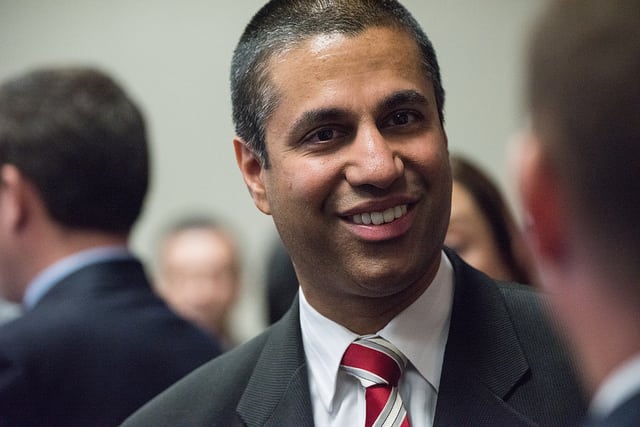Latest News

FCC Chairman Ajit Pai. Photo: Flickr
The U.S. Federal Communications Commission (FCC) is set to vote on a critical and contentious proposal this week that could prevent city governments from charging access fees for 5G infrastructure construction and installation, and force cities to approve or deny carrier applications within as little as 60 days or as many as 90 days. The vote, scheduled Wednesday, Sept. 26, puts the agency at odds with city governments that have already partnered with carries to deploy 5G small cells and other infrastructure networks.
The proposal’s supporters, including the FCC’s Republican majority, claim that the new rules would accelerate the pace of 5G rollout while saving carriers billions of dollars in fees and expenses. The savings, the agency said, could then be re-invested by carriers in connecting rural and underserved communities. Telecommunications companies in the United States are eager to invest in and deploy 5G infrastructure to stay ahead of nations like China, which have far fewer regulatory hurdles. FCC Chairman Ajit Pai admitted that striking a balance between leading the world in 5G innovation and adhering to free-market economics would be a major challenge for the U.S. He had stated publicly that the telecom industry is relying on his commission to speed up infrastructure rollout and 5G service deployment by cutting the red tape and eliminating regulatory hurdles.
The FCC proposes that cities adhere to a ‘reasonable’ standardized application fee structure — a one-time $100 fee to apply, and $270 per year to maintain each small cell installation. This follows another order from March 2018, in which the FCC voted to exclude small cells from the same category of federal review procedures required for 200-foot cellphone towers — making small cell deployment much easier and faster for carriers.
“Our action would eliminate around $2 billion in unnecessary costs, which would stimulate around $2.5 billion of additional buildouts,” Pai and other Republican commissioners wrote in the proposal. “And that new service would be deployed where it is needed most — 97 percent of new deployments would be in rural and suburban communities that otherwise would be on the wrong side of the digital divide.”
Municipal governments argue that it is their right to charge fair market rate fees to carriers wanting to install small cells or other physical elements on public infrastructure. Some state governments also feel that the FCC proposal would steamroll legislation that some have already put into place to facilitate 5G small-cell deployment.
The FCC acknowledged that many states (currently more than 20) and localities have “acted to update and modernize their approaches to small cell deployments. They are working to promote deployment and balance the needs of their communities. At the same time, the record shows that problems remain,” The FCC’s proposal also stated that “many state and local officials have urged the FCC to continue our efforts in this proceeding and adopt additional reforms. Indeed, we have heard from a number of local officials that the excessive fees or other costs associated with deploying small scale wireless infrastructure in large or otherwise ‘must serve’ cities are materially inhibiting the buildout of wireless services in their own communities.”
Despite the pitch to rural governments, not all of the beneficiaries here are on board with the FCC’s plan. Last week, Paul Smith, Vice President of Governmental Affairs for the Rural County Representatives of California (RCRC), wrote a letter to the FCC expressing the organization’s concerns with the language of the proposal. Smith wrote that while the RCRC supports policies that close the digital divide, the organization believes that “the proposed language set forth in the Order would actually incentivize increased deployment in already-served, historically high-cost markets.”
Smith pointed to certain elements of the proposal to support his claim. “The FCC’s proposed new collocation ‘shot clock’ category is too extreme. The proposal designates any preexisting structure, regardless of its design or suitability for attaching wireless equipment, as eligible for this new expedited 60-day shot clock,” he wrote. “The FCC’s proposed recurring fee structure is an unreasonable overreach that will harm local policy innovation. We disagree with the FCC’s interpretation of ‘fair and reasonable compensation’ as meaning approximately $270 per small cell site … The FCC’s decision to prohibit a municipalities’ ability to require ‘in-kind’ conditions on installation agreements is in direct conflict with the FCC’s stated intent of this Order and further constrains local governments in deploying wireless services to historically underserved areas.”
The FCC said it drafted the order based on feedback from multiple city and state governments, as well as carriers and investors. FCC Chairman Pai and his colleagues said that they are seeking a fair, yet realistic path to 5G rollout in the United States. “We have reached a balanced, commonsense approach, rather than adopting a one-size-fits-all regime. This ensures that state and local elected officials will continue to play a key role in reviewing and promoting the deployment of wireless infrastructure in their communities,” the agency wrote in its proposal.
For a better understanding of 5G infrastructure and deployment policy and how the FCC and other regulatory bodies impact rollout speeds, check out Via Satellite’s free webinar, “What is 5G Exactly? What Everyone Needs to Know About Next Generation Wireless Networks” on Thursday, Sept. 27 at 11:00 a.m. with 5G Americas President Chris Pearson. The one-hour introductory webinar is a preview event for DC5G 2018 on Nov. 12 and 13 in Washington D.C. Please join us as we discuss this and other 5G developments for a variety of services and applications.
Get the latest Via Satellite news!
Subscribe Now